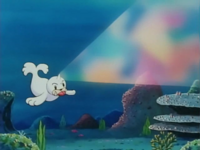Since we are progressing steadily towards reading Frankenstein, I figured that I would write/type a blog post about this staple in gothic fiction. I'd like to say that this post will have a clear, straightforward theme throughout it. However, I am sure that I will end up deviating in some way, seeing as this post is dedicated almost solely on my reactions and ruminations on Mary Shelley and her brainchild Frankenstein.
To start, I was astonished to hear that Mary Wollestonecraft Shelley (a mouthful for a name) wrote the classic masterpiece at the tender age of 18, and even more surprised to hear that she had written it because of a writing competition between her lover, her step-sister, my namesake Lord Byron, and herself while they were all on vacation. First off, I pity these four to an extent. All alone together, and the most fun thing they could think of doing was writing stories? I could see some of the merit in writing stories for competition; it is time-consuming enough to be able to spend a lot of vacation time occupied, and obviously if not for the story-writing, Frankenstein may never have come into existence, and its influence across literature and popular culture would never happen. However, writing stories, especially one as long as Frankenstein, is a bit tedious, and definitely not something one would be able to do without some degree of mental fortitude and diligence.
Also, I found the format of Frankenstein to be a bit unorthodox; a man writes to his sister about the story of a man he saved in the North Pole. Epistolary writing adds a tone of realism to the text, but Frankenstein is a romantic novel. Also, epistolary writing is not a very common writing style. Off the top of my head, I can think of no other works that even use epistolary writing. Although this may be because of my lack of literary knowledge, I think that other people would be equally challenged in finding a work of fiction that uses epistolary writing.
Finally, although I didn't learn this today, ironically enough, Frankenstein is the name of the professor, but not the actual monster. However, for what is probably decades, the monster has been given the misnomer of Frankenstein, instead of the professor. Various movies and novels use the term "Frankenstein" to describe the creation of Victor Frankenstein, when the monster actually never had a name for itself. I'm not completely sure why I put this superfluous piece of information in here, but I found it interesting, and hopefully others will too.
That just about wraps up this blog post. Cue the fanfare and the parade! Well, not really. Anyway, I'll be back in about...six weeks? Until then.
Byron C.
 The introduction of the book is very interesting. Shelley starts out with the captain of a ship trying to reach the North Pole. Walton, the captain, is writing to his sister, Margaret, about his adventures. While on the ship Walton sees a large figure being pulled by sleigh dogs. The large figure obviously represents the monster created by the main character, which we find to be Victor Frankenstein. Walton’s obsession for reaching the North Pole is also an interesting concept to keep in mind as you finally stop reading the letters and start reading about Victor’s life because it will soon show a parallel with one of Victor’s obsessions.
The introduction of the book is very interesting. Shelley starts out with the captain of a ship trying to reach the North Pole. Walton, the captain, is writing to his sister, Margaret, about his adventures. While on the ship Walton sees a large figure being pulled by sleigh dogs. The large figure obviously represents the monster created by the main character, which we find to be Victor Frankenstein. Walton’s obsession for reaching the North Pole is also an interesting concept to keep in mind as you finally stop reading the letters and start reading about Victor’s life because it will soon show a parallel with one of Victor’s obsessions.





